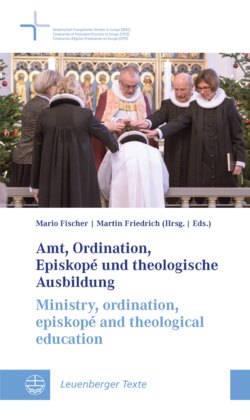Читать книгу Amt, Ordination, Episkopé und theologische Ausbildung / Ministry, ordination, episkopé and theological education - Группа авторов - Страница 18
На сайте Литреса книга снята с продажи.
1.5The hermeneutical foundations for the doctrinal conversation 1.5.1Unity in reconciled diversity
Оглавление20. A systematic Protestant exposition on ministry, ordination and episkopé cannot limit itself to restating the confessional writings of the Reformation or to the historical beginnings of a Protestant doctrine of ministry. The models found in the Scriptures and in confessional writings on the subject of church order are a guide, but not binding for present-day church constitutions. There have been many diverse developments in the Protestant ordering of ministries from the time of the Reformation to the present day (cf. Resource Material, ch. 4.1). The dialectic between church tradition and present day requirements involves hermeneutical processes that are open and communal in the search for the most beneficial structures in every generation. Immutable ministerial structures would be detrimental to the mission of the church. However, there has been a considerable continuity in the understanding and ordering of ministries through the centuries. Functional equivalents and parallels can also be discovered in differing structures and terminologies. The primary aim of hermeneutic efforts is not to unify structures and designations for ministry for their own sake, but to come to a deeper ecumenical understanding of the spiritual realities which are held in common (including the legitimacy and the limits of diversity), and to encourage structures that can be mutually recognised.
21. The Leuenberg Agreement bears witness to the unity given in Christ, which allows the signatory churches to live in reconciled diversity and to grow in unity and shared mission in the world. It is important that fundamental agreement in the understanding of ministry, ordination and episkopé is not only asserted, but is shown to have a theological foundation. An ecumenical hermeneutics of unity in reconciled diversity founded in God as the fullness of life can contribute towards deepening the common understanding of ministry, ordination and episkopé, as it has done already among Protestant churches. This can in turn contribute to the ecumenical dialogues with other churches and the broader search for visible unity within the ecumenical movement. An important contribution from the Protestant churches in this area is the conviction that the visible unity of the church worldwide will be a differentiated unity. This is also true for the structures of ministry. The hermeneutic task does not, therefore, aim at comprehensive ecclesial uniformity, but at an overcoming of divisive differences, thereby contributing towards greater visibility in church unity.
22. A hermeneutics of unity in reconciled diversity is not of course sufficient in itself to overcome church divisions which are evident in an ecumenical context, particularly over the question of ministries. Church divisions are not simply the result of historical developments but are also the consequence of decisions taken by the churches and their leaders. It is an open question whether or not the differences in the understanding of church and ministry (which still exist between the churches of CPCE and other churches) are insuperable. A dynamic view of confessional identity reckons with the activity of the Holy Spirit, and that also means accepting the historical developments of identities.
